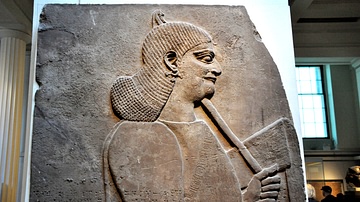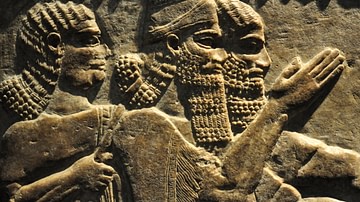Search
Did you mean: Tiglath Pileser I?
Search Results

Image
King Tiglath-pileser III in a Ceremony
The Assyrian King Tiglath-pileser III (reigned 744-727 BCE) wears a ceremonial robe and holding a bow, once facing 2 high officials (no longer preserved but recorded in a drawing). Behind him, stands a beardless attendant holding a spear...

Definition
Sargonid Dynasty
The Sargonid Dynasty was the last ruling house of the Neo-Assyrian Empire from 722-612 BCE, beginning with the reign of Sargon II and ending with fall of the Neo-Assyrian Empire. Some of the most famous kings in the history of Assyria come...

Image
Arms-bearer of Tiglath-pileser III
This gypsum wall relief depicts a beardless man holding a bow and quiver; this is the "Keeper of the King's Bow". His earring has 3 knob-like projections. Neo-Assyrian Period, reign of Tiglath-pileser III, circa 728 BCE. From the Central...

Article
History of Assyria
The foundation of the Assyrian dynasty can be traced to Zulilu, who is said to have lived after Bel-kap-kapu (c. 1900 BCE), the ancestor of Shalmaneser I. The city-state of Ashur rose to prominence in northern Mesopotamia, founding trade...

Definition
Sargon II
Sargon II (r. 722-705 BCE) was one of the most important kings of the Neo-Assyrian Empire as founder of the Sargonid Dynasty which would rule the empire for the next century until its fall. He was a great military leader, tactician, patron...

Image
Alabaster Panel from the Central Palace of Tiglath Pileser III
This alabaster panel was part of the decorative scheme of the palace of King Tiglath Pileser III (reigned 745-727 BCE) at Kalhu. The king is shown in his chariot, while in another scene above Assyrian soldiers drive out prisoners and flocks...

Image
King Tiglath Pileser III Holds a Bow
Siege scene depicting the Assyrian king Tiglath Pileser III armed with a bow. Next to him, an Assyrian warrior wears a classical pointed Assyrian helmet and holds a dagger. Alabaster wall relief, from Nimrud (ancient Kalhu), northern Mesopotamia...

Image
Tiglath Pileser III
Detail of a gypsum wall relief showing the Assyrian king Tiglath Pileser III from the South-West palace at Nimrud, Mesopotamia, modern-day Iraq, Neo-Assyrian Empire, 745-727 BCE. The king is recognizable by his long beard, royal head cap...

Image
Tiglath Pileser I
From a rock relief found in 1862 CE at Birleyn, also called "The Tigris Tunnel", in modern-day Turkey. Tiglath Pileser I is identified in the cuneiform inscription. British Museum, London

Definition
Kalhu / Nimrud
Kalhu (also known as Caleh, Calah, and Nimrud, in modern-day northern Iraq) was a city in ancient Mesopotamia that became the capital of the Assyrian Empire under Ashurnasirpal II (r. 884-859 BCE) who moved the central government there from...